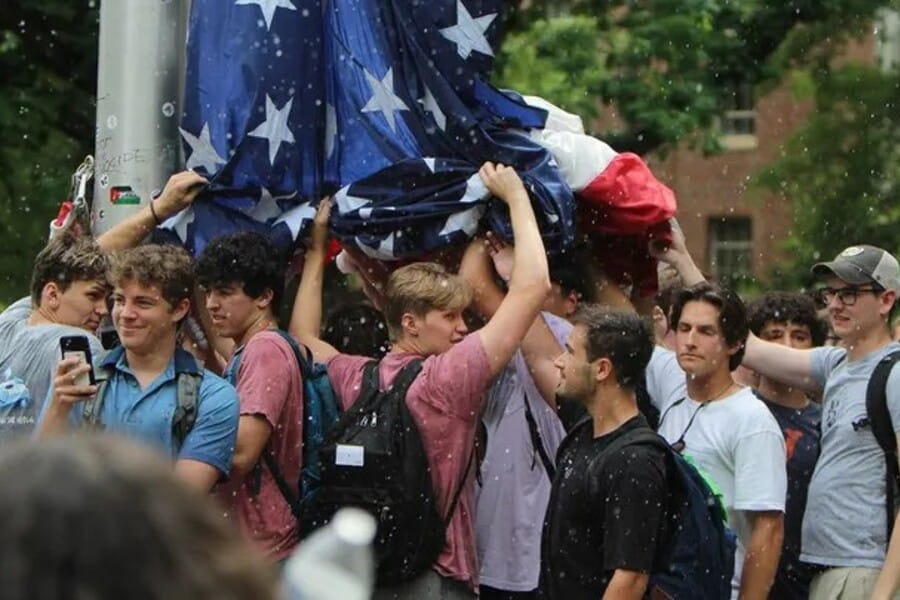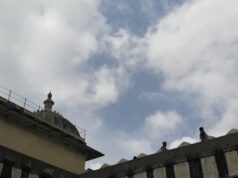
In an escalating demonstration of campus activism intertwined with national identity issues, the University of North Carolina at Chapel Hill became the epicenter of a fervent debate this past Tuesday. At the heart of the controversy was the replacement of the American flag with a Palestinian flag at the university’s main quad, a symbolic act that ignited a fierce confrontation between student groups and drew nationwide attention.
The incident unfolded early Tuesday morning when anti-Israel protesters, composed of both students and several non-affiliated activists, lowered the American flag—which had been positioned at half-mast in memory of four Charlotte officers killed in the line of duty—and hoisted a Palestinian flag in its stead. This act of protest comes amid a broader context of heightened tensions and ongoing conflicts in the Middle East, which have reverberated across campuses nationwide.
The initial replacement of the flag was met with a swift response from UNC’s administration. Chancellor Lee Roberts, along with law enforcement officers, intervened to reinstall the American flag. However, the protesters’ attempts to retake the flagpole continued, leading to a series of clashes throughout the day.
Guillermo Estrada, a student and fraternity member of Pi Kappa Phi, class of 2027, took to social media to express his dismay and the patriotic stand he and his fraternity brothers took against the protesters. “When I walked to class and saw the Palestinian flag at the quad, it was a shock,” Estrada stated in a post on X (formerly Twitter), which quickly went viral, amassing over 25,000 likes. “My fraternity brothers and I stood firm, enduring thrown bottles and verbal abuses, to protect the flag that symbolizes the freedoms and values many have fought and died for.”
The confrontation did not end with the flag’s reinstatement. Videos circulated online show groups of students singing the National Anthem and chanting “USA” as a form of counter-protest, encapsulating a moment of intense nationalistic fervor that resonated with many around the country. This led to the establishment of a protective barricade around the flagpole, with Chancellor Roberts vowing to maintain the American flag’s presence as a statement of university policy and national pride.
Amid the chaos, a GoFundMe page was set up for Estrada’s fraternity, raising over $57,000 to support their actions, which the page described as a stand for patriotic values. The fundraiser highlighted the community’s financial and moral support for the student’s actions, reflecting a divided yet passionate response from the public.
The university administration took steps to manage the situation by canceling classes and non-mandatory activities for the afternoon. About 30 protesters were detained after they refused to disband an encampment on the quad, following orders from the administration to clear the area. Chancellor Roberts and Provost Chris Clemens issued a joint statement emphasizing the university’s commitment to free expression, yet underscoring the necessity to adhere to campus policies.
“This university is for everyone, and while we support the right to peaceful protests and expression, it must be conducted within the framework of our established policies,” Chancellor Roberts asserted. He emphasized that the university administration is committed to ensuring that all expressions and demonstrations are conducted safely and respectfully, aligning with the institution’s values of free speech and civic engagement. By maintaining this balance, the Chancellor reassured both students and the broader public that the campus remains a safe and orderly environment conducive to learning and discussion.
The recent protests at UNC Chapel Hill are part of a broader trend observed across several high-profile academic institutions in the United States, including Columbia University and the University of California. These institutions have become stages for intense debates concerning the role and limits of political expression within academic settings. The demonstrations, varying in size and scope, challenge the traditional boundaries of academic freedom and the interplay between education and political activism.
Critics of these protests argue that such actions, especially when they involve the replacement or removal of national symbols, significantly disrupt the educational environment. They contend that these acts can detract from the academic focus of universities and may disrespect symbols that many citizens hold dear. The critics stress the importance of keeping educational institutions as places primarily for learning and personal development, rather than battlegrounds for political conflict.
On the other hand, supporters of the protests view them as crucial expressions of solidarity with global causes and as vital challenges to entrenched narratives about nationalism and foreign policy. They argue that universities, as centers of higher learning and critical thinking, are exactly the places where complex global issues should be confronted and debated. These advocates believe that fostering an environment where students can engage with international issues and express support for global justice contributes to the educational mission by broadening perspectives and encouraging active global citizenship.
The debate over these protests underscores a deep divide in perceptions about the purpose and priorities of academic institutions in today’s politically charged environment. It raises significant questions about how universities can and should balance the need for open expression with the imperative to maintain an environment that supports all aspects of student welfare and academic integrity. As demonstrations continue to unfold, they not only reflect the ongoing global political tensions but also challenge universities to rethink their roles in shaping the citizens of tomorrow.
As the situation at UNC-Chapel Hill continues to develop, it remains a poignant reminder of the complex interplay between local actions and global political climates. The university’s handling of the event underscores the challenges faced by educational institutions in balancing free expression with maintaining order and respecting community standards.
This incident not only reflects the ongoing tensions related to the Israel-Palestine conflict but also raises critical questions about the role of universities as arenas for political expression and the boundaries of such expressions. As the nation watches, the events at UNC Chapel Hill will likely inspire further dialogue and possibly changes in how campuses manage protests and uphold free speech while ensuring respect for all community members.








